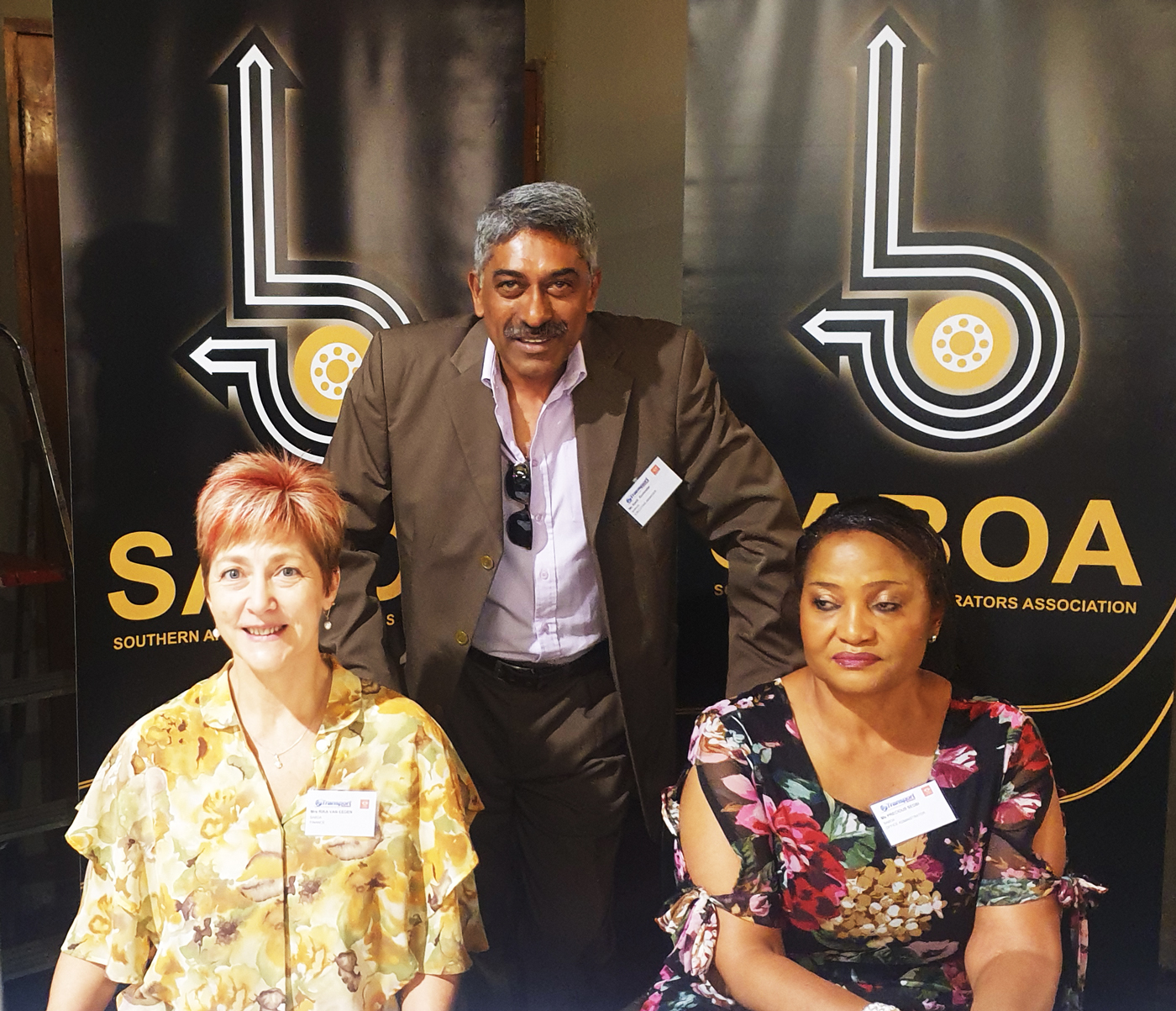Farewell to a bus and coach legend
Farewell to a bus and coach legend
Bazil Govender, SABOA’s executive manager, is leaving the association at the end of April. CHARLEEN CLARKE caught up with him one last time prior to his departure…
FOCUS was appointed as SABOA’s official magazine just over a year ago. Since then, we’ve worked with Bazil on an almost daily basis. His commitment to the bus and coach industry was evident from the start, as were his incredible patience and tenacity when dealing with the many government officials and departments with which he interacted. But we wanted to find out more about his career and achievements thus far…
FOCUS: Please give us a brief rundown on your career prior to your joining SABOA.
Bazil Govender: Prior to joining SABOA, I had already worked in the transport and logistics sector for well over three decades. My experience spans various areas, including operations, marketing, customer service, administration, and general management.
I have worked with a variety of companies in the sector, from startups to established brands, and have gained valuable insights into the challenges and opportunities facing the industry. This has allowed me to progress to an executive level, with the ability to engage from the shop floor, through the boardrooms to the hallways of government.
Why did you decide to join SABOA?
I was drawn to its mission of advancing the interests of the bus and coach industry in South Africa. I saw an opportunity to use my skills and experience – gained over 14 years in the sector – to make a positive impact and contribute to the growth and sustainability of the sector.
It was also the turn of a decade and, given the decades-long uncertainty endured by the industry, I embraced this as a challenge to be part of the solution in transforming and transitioning the industry.
Given the credo of being the voice of the bus and coach industry, I also firmly believed there needed to be a face to the voice, enhancing the belief that the association would reposition itself and subscribe to developing solutions for both macro and micro transport-related challenges.
What did you hope to achieve at SABOA?
At SABOA, my main goal was to work collaboratively with the team and stakeholders to develop strategies that would address the industry’s challenges – such as safety, regulatory compliance, sustainability, policy certainty, and transformation – whilst modernising the association and its image. I also hoped to build and solidify strong relationships with members and other industry players to foster collaboration and knowledge sharing.

Have you achieved those things?
It is important to note that whilst this is a critical and influential portfolio, progress and success cannot and will not be achieved in isolation. It requires knitting together a range of stakeholder interests and also strategically managing competing ideologies and common purposes. That was perhaps the most challenging aspect of the tenure, but on reflection I can safely say that the momentum has been created for positive and ongoing engagements.
Yes, I am proud to say that we have achieved significant progress in advancing (and managing) the cohesive approach of the industry and its members towards matters affecting and influencing the industry.
We have also managed to keep the narratives alive through the difficult period of Covid, as well as post-Covid, achieving significant progress in advancing the interests of the bus and coach industry in South Africa.
On a personal note, I believe the creation of authentic identities for the sub-sectors within the industry has raised the profile and awareness of the scholar learner, tour charter, cross-border, inter-city, and long-distance operators, as well as the SMME operators and stakeholders, together with the deep and extended value and supply chain. These sub-sector entities now have formal platforms and communication channels to bring sector-specific issues to the fore.
A more collaborative approach with labour and the Bargaining Forum has also elevated the role SABOA can play within that collective bargaining space. This is important for critical information sharing.
Our collaborations with government agencies, industry associations, and other stakeholders to drive positive change and advocate for policies and regulations that support the industry’s growth have created a strong foundation for the industry to transition.
Lastly, in my view, the biggest contribution has been the transparent communications processes and the accessibility to information, which would rank as the top achievement. The industry stakeholders are now in a “knowing” position on just about all matters of public transport related to the bus and coach industry.

What are the greatest challenges facing the bus and coach industry in SA?
The challenges are numerous, as outlined in previous columns, but they are not insurmountable. However, it will take a collaborative effort from all stakeholders, with deep resolve, to reach the desired outcomes.
SABOA has an integral role to play in both the transformation and transition of the industry, and will remain key to these efforts within the broader context of sustainable public transport.
The transformation of the industry requires a shift in the equity and ownership demographics, while gender and generational balance are also part of the next steps.
Key to these numerous challenges are:
- The integration of public transport, in line with formal Integrated Public TransportNetwork (IPTN) plans and transport authorities.
- The funding conundrum, which will require agile and innovative give and take collaborations to transition from the status quo.
- Patience and navigation around the misaligned and non-aligned approaches across the tiers of government, as well as at inter-governmental level. We have highlighted this in previous columns.
- Perhaps the most pressing challenge when it comes to the sustainability and survival of the industry is the coordinated approach to a violence avoidance strategy. This must address the constant attacks, disruptions, and intimidation of the industry operations across all sub-sectors.
This is an industry sector that has a solid track record for safety in comparison to the other sectors and in the context of the number of daily trips undertaken. However, it remains critical for bus and coach operators to prioritise safety and adhere to strict safety standards, whilst dealing and coping with regulatory compliance, rising fuel costs, and a lack of investment in infrastructure.
Is SABOA able to help to resolve those issues?
SABOA is constantly and actively working to address these issues by collaborating with government at all levels, as well as with related agencies and industry partners. We remain committed to collaborating at all levels and supporting our members to help them navigate these challenges and succeed in a rapidly changing industry.
To this end, the SABOA board and council, together with the Provincial Executive Committees (PECs), were all democratically elected to office in September 2021, and will serve a tenure until August 2025. This sees a mix of demographic, gender, owner, and sub-sector representation at all levels, creating some continuity in the guiding and decision-making structures.
Where will your career take you next?
Having grown and developed in the position of executive manager at SABOA, thanks to the profile of operating at an industry leader level, I am committed to continuing to advocate for the interests of the bus and coach industry and driving positive change. I plan to stay involved in the industry and work closely with stakeholders to identify and address emerging challenges and opportunities, at a corporate level.
Do you have any parting words?
First up, to the SABOA Exco – thank you for putting your trust in me to lead the association on behalf of the industry.
To the bus and coach industry, I would like to say that I am grateful for the opportunity to have served as a leader in this sector. It’s a challenging and rewarding industry, and I am truly inspired by the resilience and determination of the diverse stakeholder base and people who work within the industry.
Although I am not lost to the industry, having taken up another challenge that sees me still involved in people transport, I encourage all stakeholders to continue to collaborate, innovate, and strive for excellence, and I look forward to seeing the industry thrive in the years to come.
Published by
Charleen Clarke
focusmagsa




